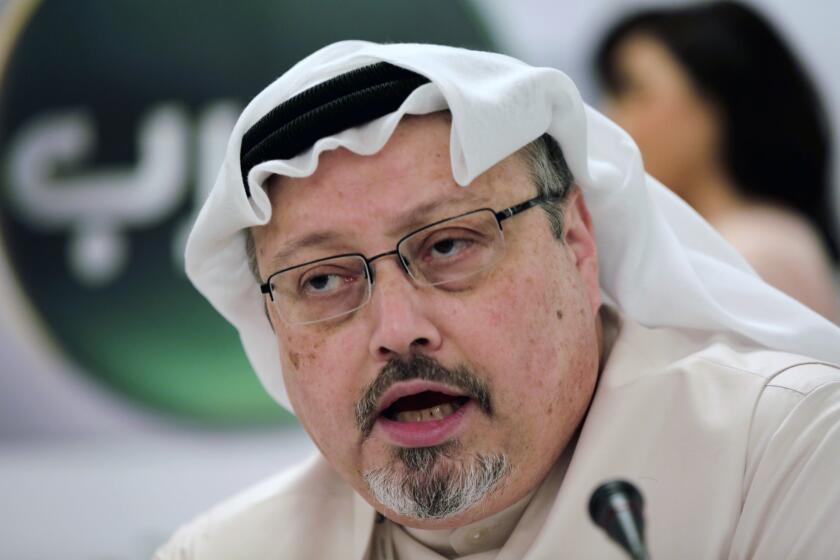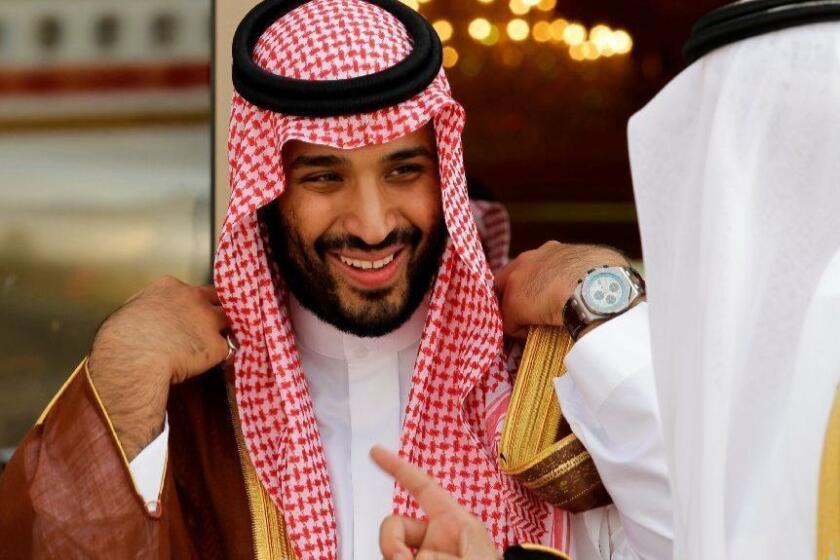Biden response to report on Khashoggi killing angers both Saudi Arabia and its critics
- Share via
BEIRUT — Throughout his campaign, President Biden vowed to take a harder line with Saudi Arabia. Its leaders, he insisted, would need to act responsibly or “pay the price” for reckless moves and be made “the pariah that they are.”
But after his administration released a declassified U.S. intelligence report last week blaming Crown Prince Mohammed bin Salman for the 2018 killing of Saudi dissident journalist Jamal Khashoggi, it didn’t quite work out that way.
Washington imposed sanctions on the hit team dispatched to capture or kill Khashoggi in the Saudi Consulate in Istanbul, Turkey, and placed visa restrictions on 76 others it said had threatened dissidents overseas. The crown prince, who the U.S. says ordered Khashoggi’s silencing, was left untouched.
Administration officials framed that decision as a way of recalibrating rather than rupturing the relationship with Riyadh.
But it also underscores the realpolitik facing Biden and the difficult question of how to deal with a figure almost certain to become the leader of a longtime Middle Eastern ally. The U.S. continues to count on Saudi Arabia as a bulwark against Iran and Islamic extremism in the region, making strong condemnation and punishment of the kingdom’s misdeeds a tricky business.
In trying to thread that needle, the new administration has ended up angering both the crown prince and his circle, who reject the intelligence report, and human rights defenders, who see him as having received barely a slap on the wrist.
Khashoggi’s killing called for more accountability.
State Department spokesman Ned Price defended Biden’s pullback from a full-throated censure, saying the administration sought to retain the influence to “shape” the Saudi government’s choices.
“It is undeniable that Saudi Arabia is a hugely influential country in the Arab world and beyond,” Price told reporters Monday. “The choices that Riyadh makes will have outsized implications for the region and outsized implications for countries in the region and countries beyond the region, including for the United States.”
Aside from the sanctions and visa ban, Price urged Saudi Arabia to “adopt institutional, systemic reforms and controls to ensure that anti-dissident activities and operations cease and cease completely.”
The statement mollified few critics, including Saudi dissidents abroad.
The Saudi crown’s new adversary is a coronavirus not subject to the whims of a brazen desert ruler.
“While we welcome the publication of the report, we await real actions to bring justice in the heinous murder of journalist Jamal Khashoggi and guarantees that such crimes are never committed against people who express opinions that amount to criticism of the Saudi regime’s policies,” said Madawi al-Rasheed, spokeswoman for the National Assembly Party, an opposition group of mostly exiled Saudi figures.
Fawaz Gerges, an expert on Middle Eastern politics at the London School of Economics, said the Biden administration’s response simply continued previous U.S. policy toward Saudi Arabia, where tough talk is belied by weak action.
“Since the beginning of the Cold War to the present, the U.S. has prioritized its geo-strategic and economic interests at the expense of human rights and the rule of law,” Gerges said. “There’s a huge gap between rhetoric and reality.”
The consensus among the U.S. foreign policy establishment, he said, was that energy, arms sales and calm markets were the priority, and that the alternative to the authoritarians in the region was chaos like that seen in Libya and Syria.
Mohammed bin Salman, the heir apparent to his father’s kingdom, traded numbers with Amazon’s CEO at a 2018 event in Los Angeles. That’s when the trouble began.
For its part, Saudi Arabia is furious. Hours after the report’s release, the Saudi foreign ministry rejected its findings as “negative, false and unacceptable.”
“It is truly unfortunate that this report, with its unjustified and inaccurate conclusions, is issued while the kingdom had clearly denounced this heinous crime, and the kingdom’s leadership took the necessary steps to ensure that such a tragedy never takes place again,” the statement said.
“The kingdom rejects any measure that infringes upon its leadership, sovereignty, and the independence of its judicial system.”
Other Gulf countries closed ranks. The United Arab Emirates, Kuwait, Bahrain and even Qatar — which only recently patched up relations with Riyadh — issued statements reaffirming Saudi Arabia’s sovereignty and stability.
Loujain Hathloul, who came to prominence after defying a ban on women driving in Saudi Arabia, was released Wednesday after 1,001 days in prison.
In Crown Prince Mohammed, the Biden administration is dealing with a figure who began stirring up controversy even before Khashoggi’s assassination.
Since he essentially took over the reins of government from his father, King Salman, in 2015, the crown prince has launched a disastrous war in Yemen, where a Saudi-led bombing campaign and blockade have had a horrific toll on civilians and pushed the country to the brink of famine. He reportedly had Lebanon’s prime minister, Saad Hariri, kidnapped, forcing him to resign on television before international intervention made the prince back down.
At home, although Mohammed pushed some social reforms at breakneck speed, he presided over a supposed anti-corruption dragnet that critics dismiss as a gambit to consolidate power. Activists, clerics, even other members of the royal family who challenge his authority — none escape punishment in an atmosphere where dissent, no matter how mild, can be dangerous, if not deadly.
The killing of Khashoggi in October 2018 proved that in horrific fashion.
Saudi Arabia’s crown prince still seeking to rehabilitate international image two years after Jamal Khashoggi’s death.
The Saudi insider-turned-critic, who wrote columns for the Washington Post, entered the Saudi Consulate in Istanbul for what was supposed to be a simple bureaucratic procedure and instead encountered the “Tiger Squad,” members of the crown prince’s personal protection detail. A struggle ended in Khashoggi’s death. His corpse was dismembered with a bone saw and buried somewhere off site; his remains have yet to be found.
Saudi Arabia maintains that Tiger Squad operatives acted beyond their orders; eight of 11 suspects have been sentenced to jail time or death.
But the U.S. intelligence report said the crown prince had approved the operation. “We base this assessment on the Crown Prince’s control of decision-making in the Kingdom, the direct involvement of a key adviser and members of Muhammad bin Salman’s protective detail in the operation, and the Crown Prince’s support for using violent measures to silence dissidents abroad, including Khashoggi,” the report says.
Saudi media have gone into overdrive in defense of the crown prince. Commentators pooh-pooh the report’s findings as little more than amateurish guesswork. Analysts conjure up a web of nefarious adversaries who they say are leading a conspiracy to tarnish the kingdom’s leadership.
Oscar winner Bryan Fogel’s documentary “The Dissident” probes the gruesome murder of Saudi journalist Jamal Khashoggi.
On Twitter, the country’s most popular social medium, activists declare fealty to the crown prince while sharing videos of Abu Ghraib, the Iraqi prison complex where U.S. troops tortured prisoners, as an example of the United States’ dark human rights record.
“Everyone knows it’s a report not worthy of a first-year journalism student let alone the world’s largest intelligence apparatus,” Saudi commentator Mohammed Al-Sulami tweeted.
Others dismiss the Biden administration’s moves as little more than posturing for a domestic audience, an attempt to draw a distinction between the president’s approach and the carte blanche that former President Trump gave Riyadh.
“It’s theatrics and cosmetics,” said Ali Shihabi, a commentator close to the Saudi government.
Though Khashoggi’s killing was a “horrible tragedy,” he said, it was one individual and other governments had done worse.
“The U.S. government went in and destroyed Iraq,” Shihabi added, referring to the 2003 invasion and its aftermath. “Who was held accountable for that?”
Breaking News
Get breaking news, investigations, analysis and more signature journalism from the Los Angeles Times in your inbox.
You may occasionally receive promotional content from the Los Angeles Times.
He warned that Riyadh’s displeasure with Washington would push it to look beyond the U.S. for support. As an example, he noted that the kingdom has turned to China — already its biggest trade partner — to ramp up its ballistic missile program even as U.S. congressional leaders seek to limit weapons sales.
“This isn’t aid to Saudi Arabia. It’s paying top dollar for this, and it can get equipment that is as good elsewhere,” Shihabi said. “This alliance has already shown its limitations, so all this does is accelerate a desire by the kingdom to anchor its strategic relationships in a more diversified manner.”
Gerges of the London School of Economics sees little hope that Biden — or any other president — will change Washington’s Saudi Arabia policy to be more fully in line with pro-democracy values.
“Even if Biden punishes MBS,” Gerges said, referring to the crown prince by his initials, “there will be no long-term change.
“There’s no magic wand. You start by taking human rights and the rule of law seriously, not just paying lip service, and applying them across the board, to friend and foe.”
Times staff writer Tracy Wilkinson in Washington contributed to this report.
More to Read
Sign up for Essential California
The most important California stories and recommendations in your inbox every morning.
You may occasionally receive promotional content from the Los Angeles Times.
















